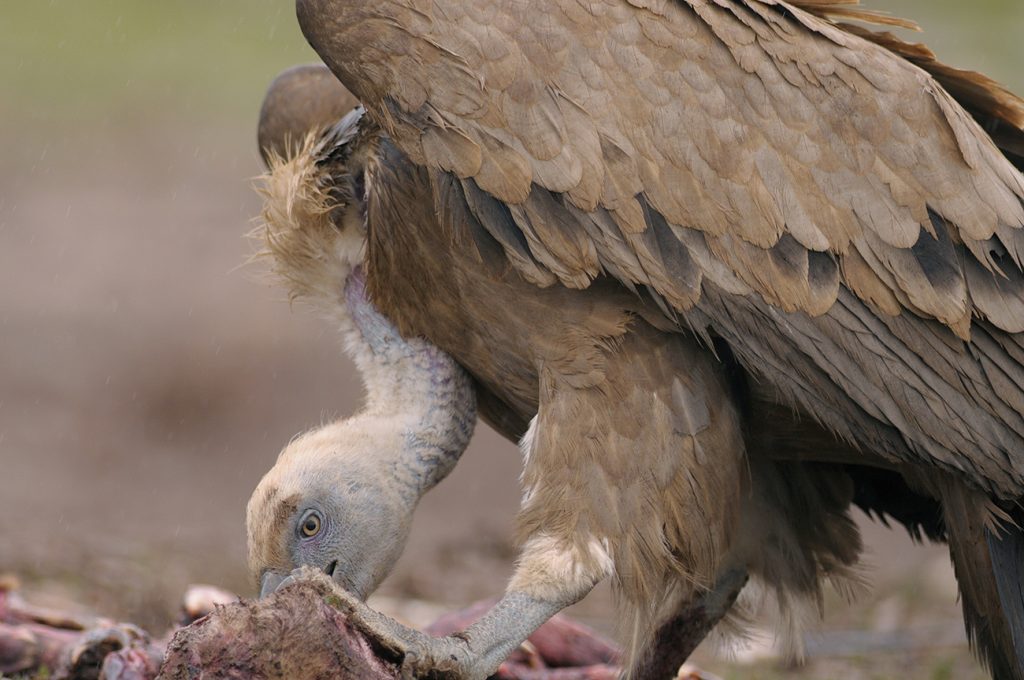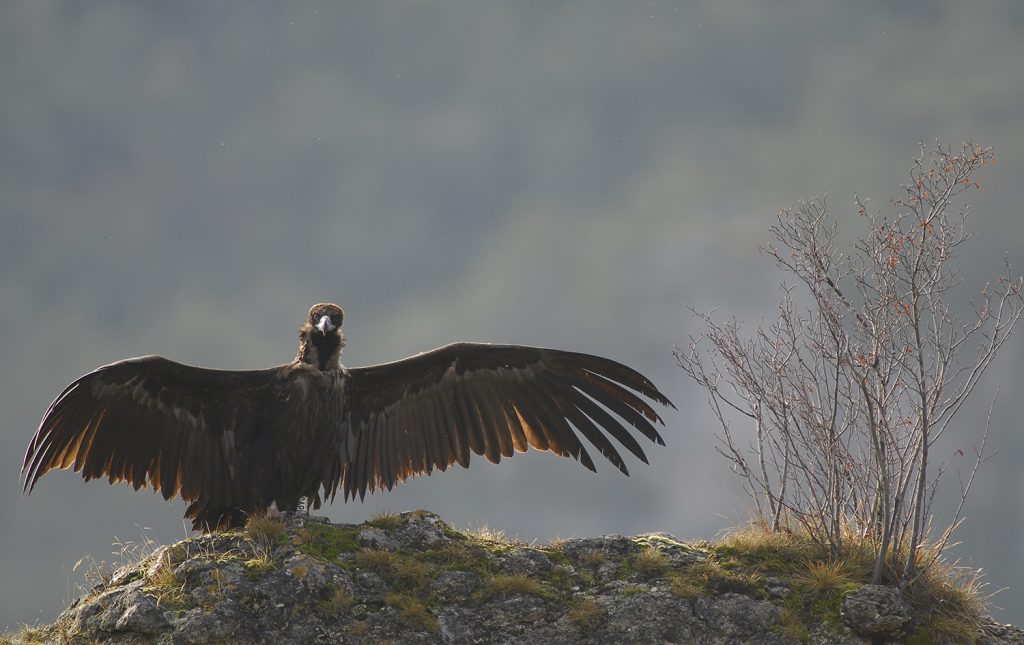What Ecosystem Service Is Provided By Vultures?
What are ecosystem services and how do birds provide them?
Ecosystem services are divers as the contributions that ecosystems (i.e. living systems) make to human well-being, co-ordinate to the European Surround Agency's Mutual International Classification of Ecosystem Services (CICES). Essentially, they direct or indirectly support our survival and quality of life.
There are iii chief types of ecosystem service:
Provisioning services are the products obtained from ecosystems such every bit food, fresh h2o, wood, fibre, genetic resources and medicines.
Regulating and maintaining services are defined equally the benefits obtained from the regulation and maintenance of ecosystem processes such every bit climate regulation, natural gamble regulation, water purification and waste management, pollination or pest command.
Cultural services include non-cloth benefits that people obtain from ecosystems such as spiritual enrichment, intellectual development, recreation and artful values.
The ecosystem services provided past birds ascend from their ecosystem functions. Their ability to fly makes birds highly mobile and able to answer to changes in the availability of essential resources such as food and habitats. This mobility and their diverse morphology and ecology means that birds live on all continents, foraging in terrestrial, aquatic and aerial environments, and therefore play important roles in maintaining ecosystem function throughout the world. Through their roles at different levels of complex food-webs birds therefore provide many important ecosystem functions. When those functions benefit humans, birds provide ecosystem services.
Examples of "direct" or provisioning ecosystem services provided by wild birds include the utilize of "eider downwards" for insulation in jackets and sleeping bags; seabird "guano" (excrement) for fertiliser; and the harvesting of puffins in Republic of iceland, sooty shearwaters in New Zealand or passerines in central and southern Europe for human being consumption.
In terms of cultural services, humans and birds have a long history of interactions dating back thousands of years, as evidenced past cave paintings and murals created by ancient civilizations. Birds often accept symbolic values and important roles in mythology and religion for many different cultures.
One of the most important cultural services provided by birds in modern times comes in the form of recreation and tourism, especially the growing pastime of birdwatching. Birdwatching is an international industry that can be a significant source of income through the publication and sale of bird guide books, the employment of local guides, and all of the activities associated with local and global ecotourism. The income from birdwatching can oft exceed other local industries that rely on natural resources. For example, it has been shown that the 14,000 bird-watchers visiting the Białowieża Forest in Poland each year spend 66% more than other visitors, spend longer in the expanse and generate USD 2.ii million of local income, which is in stark dissimilarity to the loss-making forestry manufacture.

The majority of the ecosystem services provided by birds are in the regulating and maintaining category, with the most well-known and widely-studied being pollination, seed dispersal and plant dispersal, all of which are vital to maintaining ecosystem processes and ultimately promoting biodiversity and benefitting human health. Ane clear example of how birds can provide a regulating service to humans, with associated economic benefits, is derived from their ecological function every bit consumers of pest species which can impairment agronomical crops. In State of israel the use of artificial nest boxes additional the population of Befouled Owls and Kestrels close to agronomical fields which reduced populations of rodents which would otherwise consume crops such as Lucerne. This non only boosted profits through increased yields, information technology likewise reduced economic costs and environmental contamination by eliminating the need to use rodenticides (rodent toxicant). These efforts are currently beingness replicated by BirdLife Cyprus.
It is becoming more widely acknowledged that one of the most critical roles of birds in stabilizing food webs in ecosystems, and thus providing of import ecosystem services to humans, is derived from their role as scavengers, and vultures are among the nigh efficient scavengers of them all.
What ecosystem services do vultures provide, and why do we demand them?
Obligate scavengers (i.east. those that survive solely from eating expressionless animals) such as Griffon Vultures swallow large amounts of carrion derived from animal carcasses, maintaining the transfer of energy through food webs and supporting of import ecosystem services such as nutrient recycling, removal of soil and h2o contaminants and regulating the development and spread of diseases and populations of facultative scavengers such equally foxes.
Recent studies accept shown that vultures provide an efficient, toll-effective and environmentally benign carcass disposal service which is positively valued by livestock farmers. For case, in Spain information technology has been demonstrated that exploiting the ability of Griffon Vultures to rapidly consume livestock carcasses would significantly reduce greenhouse gas emissions (by 77,344 metric tons of CO2 eq.) and economical costs ($l 1000000 in insurance payments) arising from the collection and transport of carcasses to processing plants by vehicles.
As vultures are specialized for rapidly locating and consuming carcasses they take a competitive advantage over terrestrial species such as foxes. In the absence of vultures information technology has been shown that populations of feral dogs and other facultative scavengers can increase, potentially increasing the evolution and transmission of diseases such as rabies. While vultures are likely assist to limit disease manual at carcasses, further work on this topic is urgently required.

Vultures too provide cultural and spiritual services dating back thousands of years, every bit well as recreational services in the class of ecotourism, particularly for bird-watchers and photographers. For example, it has been estimated that the potential value of viewing Griffon Vultures at a nature reserve in Israel was more than U.s.$one 1000000, and that 85% of the visitors went to the park specifically to view vultures. At that place are many other examples of the potential value of ecotourism around vulture breeding areas and feeding sites as of import sources of local income (east.g. southern Africa; Spain; Due south America). Therefore, equally tourism in Cyprus generates €2.vii billion annually and contributes 15% towards the Gdp, the projected increment in the Griffon Vulture population through the LIFE with Vultures project could provide an additional boost to local economies if some of the four 1000000 visitors each yr can exist engaged in vulture watching and photography.
It is at present widely best-selling that promoting the scavenging services provided by vultures would restore an important ecological function for the mutual benefit of vultures, the wider environment and ultimately provide socio-economic and well-being benefits to people. We promise that the LIFE with Vultures project will provide the foundations for this in Republic of cyprus.
How we will be investigating ecosystem service provision by Griffon Vultures in Cyprus
As part of the project's preparatory deportment we aim to improve our agreement of the benefits of Griffon Vultures for ecosystem functioning and human well-beingness in Cyprus to strengthen support for planned conservation actions. Nosotros will develop a conceptual model to demonstrate how Griffon Vultures could potentially collaborate with the environment and human activities in Cyprus and how these interactions would influence ecosystem services and human well-being. We volition also quantify how much feces Griffon Vultures would consume at different population levels and how this could provide environmental and economic benefits compared to existing livestock disposal practices. Finally, we will estimate the potential contribution (qualitative and quantitative) of restoring Griffon Vultures to their master breeding sites in Cyprus for ecotourism.
What Ecosystem Service Is Provided By Vultures?,
Source: https://lifewithvultures.eu/ecosystem-service-provision-what-do-vultures-do-for-us-and-the-environment/
Posted by: begayeelbectern.blogspot.com


0 Response to "What Ecosystem Service Is Provided By Vultures?"
Post a Comment